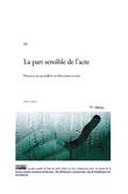Explore

Les éducateurs sociaux qui interviennent auprès de jeunes placés en foyer doivent naviguer entre des normes éducatives préconstruites et l’imprévisibilité inhérente à leur l’activité. Le quotidien, dans ses moments fantasques, place le professionnel à un degré élevé de complexité de l’agir. Prendre le risque que quelque chose puisse advenir, là où rien n’est attendu, se révèle comme axe fondateur de la pratique, là où précisément le geste spécialisé se perçoit difficilement. La part sensible de l’acte se penche sur cet agir professionnel et illustre comment les praticiens parviennent à relever ce défi.Joëlle Libois s’attelle à rendre dicible l’expertise dont relève le travail relationnel dans le quotidien du vivre ensemble. A l’aide de trois vignettes de situation en foyer pour jeunes, les pratiques quotidiennes qui engendrent du questionnement sont analysées ; là où le faire rencontre de la résistance, là où se posent des énigmes, là où se trouve un apport créatif dans la pensée.Il s’agit de saisir ce qui fait acte dans le travail social, au travers de l’explicite et de l’implicite, de la sensorialité incarnée dans la mémoire des gestes comme dans la raison. Ces positions délicates d’intersubjectivité, de présence de soi aux autres, qui vise l’inclusion dans un univers porté journellement par les problématiques de l’exclusion, mettent en œuvre des savoirs professionnels qu’il importe de rendre visibles.
This book is included in DOAB.
Why read this book? Have your say.
You must be logged in to comment.
Rights Information
Are you the author or publisher of this work? If so, you can claim it as yours by registering as an Unglue.it rights holder.Downloads
- 87 - pdf (CC BY-NC-ND) at OAPEN Library.
Keywords
- Activity analysis
- Analyse de l’activité
- formation / pédagogie
- intervention en travail social
- Jeunesse
- pedagogy/training
- Social services & welfare, criminology
- Social welfare & social services
- social work
- Society & Social Sciences
- thema EDItEUR::J Society and Social Sciences::JK Social services and welfare, criminology::JKS Social welfare and social services::JKSN Social work
- youth studies
Links
DOI: 10.26530/OAPEN_578318Editions

